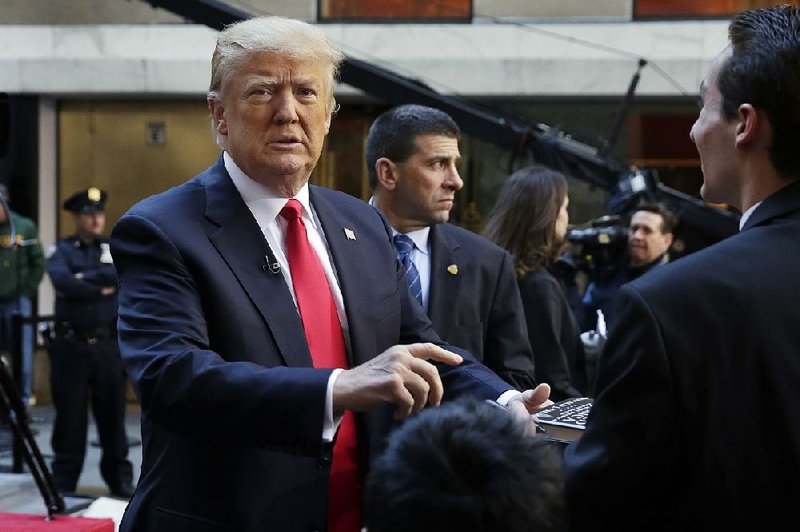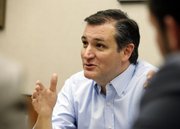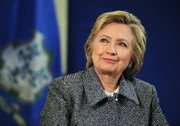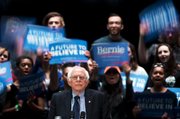HOLLYWOOD, Fla. -- Donald Trump's chief campaigners told skeptical Republican leaders Thursday that the GOP front-runner has been "projecting an image" so far in the 2016 primary season and "the part that he's been playing is now evolving" in a way that will improve his standing among general election voters.
FULL ELECTION COVERAGE
The message, delivered in a private briefing, is part of the campaign's intensifying effort to convince party leaders that Trump will moderate his tone in the coming months to help deliver big electoral gains this fall, despite his contentious ways.
The developments came as the GOP's messy fight for the White House spilled into a seaside resort in south Florida. While candidates in both parties fanned out across the country before important primary contests in the Northeast, Hollywood's Diplomat Resort & Spa was transformed into a palm-tree-shaded political battleground.
Trump's newly hired senior aide, Paul Manafort, made the case to Republican National Committee members that Trump has two personalities: one in private and one onstage.
"When he's out on the stage, when he's talking about the kinds of things he's talking about on the stump, he's projecting an image that's for that purpose," Manafort said in a private briefing.
"You'll start to see more depth of the person, the real person. You'll see a real different guy," he said.
The Associated Press obtained a recording of the closed meetings.
"He gets it," Manafort said of Trump's need to moderate his personality. "The part that he's been playing is evolving into the part that now you've been expecting, but he wasn't ready for, because he had first to complete the first phase. The negatives will come down. The image is going to change."
The message was welcomed by some party officials but criticized by others who suggested it raised doubts about his authenticity.
"He's trying to moderate. He's getting better," said Ben Carson, a Trump ally who was part of the GOP front-runner's RNC outreach team.
There were new signs of frustration among members of the Republican National Committee, who are eager for the divisive primary season to end.
"I want to see Mr. Trump begin to bring us together," said Henry Barbour, a national committee member from Mississippi. "And I haven't seen it. It's not good enough to do it for 30 minutes one day and then the other hours of the day try to divide."
On one side in the long-running battle, U.S. Sen. Ted Cruz's team warned party leaders in private briefings that only he could expand the GOP and heal deepening intraparty divisions. On the other, Trump's revamped inner circle quietly courted national committee members who openly questioned the front-runner's tone and party loyalty.
Along with Manafort, Trump sent his newly hired political director, Rick Wiley, to help improve relationships with party officials at the meeting.
Wiley said Trump could compete during the general election and even win in Democratic strongholds such as Pennsylvania, Michigan, Wisconsin -- and even deeper-blue states such as New Jersey, Oregon and Washington state.
"He might not win some of these blue states, but you can make the Democrats spend money and time," Wiley said.
While Trump's top advisers were promising Republican leaders that the GOP front-runner would moderate his message, the candidate was telling voters he wasn't ready to act presidential.
"I just don't know if I want to do it yet," Trump said during a raucous rally in Harrisburg, Pa., on Thursday that was frequently interrupted by protesters.
"At some point, I'm going to be so presidential that you people will be so bored," he said, predicting that the size of his crowds would dwindle if he dialed back his rhetoric.
Trump is increasingly optimistic about his chances in five states holding primary contests Tuesday: Rhode Island, Connecticut, Pennsylvania, Delaware and Maryland. He is now the only Republican candidate who mathematically can collect the 1,237 delegate majority needed to claim the nomination before the party's July convention.
Debate over Bathrooms
But Cruz and Ohio Gov. John Kasich -- neither of whom have a shot at taking the nomination in primary balloting -- hope Trump will fall short of a delegate majority and are working to court delegates' favor if the convention heads into a second, free-for-all round of balloting.
"We are headed to a contested convention," Cruz said in Florida. Cruz's campaign had $8.8 million on hand as of April 1, according to campaign finance reports filed Wednesday.
As Trump continued to complain of "a rigged" nomination process, he also addressed the debate in North Carolina over which bathrooms transgender people should use.
Speaking at a town-hall event on NBC's Today show Thursday, Trump said North Carolina's bathroom law, which directs transgender people to use the bathroom that matches the sex on their birth certificates, has caused unnecessary strife, and transgender people should be able to choose which bathroom to use.
"There have been very few complaints the way it is," Trump said. "People go, they use the bathroom that they feel is appropriate."
Cruz criticized Trump's "support of grown men using women's restrooms." The U.S. senator from Texas called Trump's position "a reckless policy that will endanger our loved ones."
Trump also came out against the federal government's plan to replace President Andrew Jackson with abolitionist Harriet Tubman on the $20 bill, calling it an act of "pure political correctness."
Trump called Tubman "fantastic" but said he would prefer to leave Jackson on the bill and place Tubman's image on another denomination: "Maybe we do the $2 bill," he said, "or we do another bill."
Meanwhile, Kasich posted a message on Twitter Wednesday that further illustrated the shifting dynamics of the race. "Now that Cruz is now mathematically eliminated, the only diff between him and Kasich is Kasich can defeat Clinton," the tweet said, referring to Democratic front-runner Hillary Clinton.
The super political action committees advocating for Kasich had only about $1.2 million on hand as of April 1, according to campaign-finance reports filed on Wednesday. Kasich's own campaign had $1.16 million.
Of the groups dedicated to stopping Trump, Our Principles PAC collected $8.34 million in March, the reports showed. Top donors included Cliff Asness, the chief investment officer at AQR Capital Management, who gave $1 million, and billionaire Warren Stephens, who has given a total of $2 million to the group.
Battling for Delegates
That effort to stop Trump is on full display in Pennsylvania, long an afterthought in presidential primary stakes.
Pennsylvania will award a mere 17 pledged delegates to the winner of its GOP primary on Tuesday. The remainder of its delegates -- 54 -- head to July's Republican National Convention with the ability to vote for whichever candidate they choose.
No other state will send as many unbound delegates to the Republican National Convention in Cleveland on July 18-21.
"And then the drama begins," said Michael McMonagle, a delegate candidate from Montgomery County who supports Cruz. "Who can persuade who?"
Polls show Trump leading both Cruz and Kasich in Pennsylvania, where primary contests are usually so late that the eventual presidential nominee typically is no longer in doubt.
This year, there is a real campaign in Pennsylvania, and it's about the delegates.
On Pennsylvania's primary ballot are 162 people running to be a GOP convention delegate. They are elected by congressional district, three for each of Pennsylvania's 18 districts for a total of 54.
The 17 to be awarded to Tuesday's winner -- the state party chairman, Rob Gleason; Pennsylvania's two national GOP committee members; and 14 to be named in May by party leaders -- must vote for the winner of Pennsylvania's statewide primary election, but only on the first convention ballot. If no candidate wins on that balloting, those 17 delegates are as uncommitted as the 54 elected delegates.
The delegate candidates' names appear on the ballot without any affiliation to a presidential candidate, meaning voters won't necessarily know who they are really supporting.
Some delegate candidates say they feel bound, at least on the first convention ballot, to vote for whichever presidential candidate wins their congressional district. Many are remaining noncommittal, at least publicly.
"I think that is my responsibility to hear everybody out and make a judgment at some point," said Calvin Tucker, a delegate candidate from Philadelphia. "I think that is the purpose of being uncommitted."
National GOP committeeman Bob Asher is cautioning delegates against taking a hard stance for or against a particular candidate.
"We really have to consider who we think has the best chance of beating" the Democrats, Asher said, "and when we get to Cleveland, we need to put our prejudices aside."
For the Democrats, the process is less mysterious: Primary voters select 127 delegates who are affiliated on the ballot with either Clinton or U.S. Sen. Bernie Sanders of Vermont. The rest of the state's 189 Democratic convention delegates are picked by the party and most must support the winner of the state's presidential primary vote. The state also has 21 unpledged "superdelegates" -- party leaders and elected officials who may choose any candidate at the convention.
With the odds increasingly stacked against him, Sanders acknowledged Thursday that he has "a hard path" to the Democratic nomination and that it could be difficult to overtake Clinton by persuading the party's superdelegates to switch allegiances.
Sanders's assessment came during an interview with NBC News, his first since soundly losing the New York primary to Clinton on Tuesday.
In the aftermath of the loss, Sanders's advisers have continued to suggest that he could still catch Clinton in the number of delegates awarded in primaries and caucuses by the time the nominating contests end in June.
But in the NBC interview, parts of which were broadcast on Nightly News on Thursday, Sanders said that his path to the nomination is "not unrealistic," but added: "It's a hard path. I admit that."
Asked by correspondent Andrea Mitchell if he will concede and endorse Clinton if he hasn't secured a majority of pledged delegates before the convention, Sanders said, " Look, if we do not have a majority, it's going to be hard for us to win."
Information for this article was contributed by Steve Peoples, Thomas Beaumont, Alan Fram, Jill Colvin, Errin Haines Whack and Marc Levy of The Associated Press; by Michael C. Bender, John McCormick, Kevin Cirilli and Sahil Kapur of Bloomberg News; by Jeremy Peters and Trip Gabriel of The New York Times; and by John Wagner of The Washington Post.
A Section on 04/22/2016



